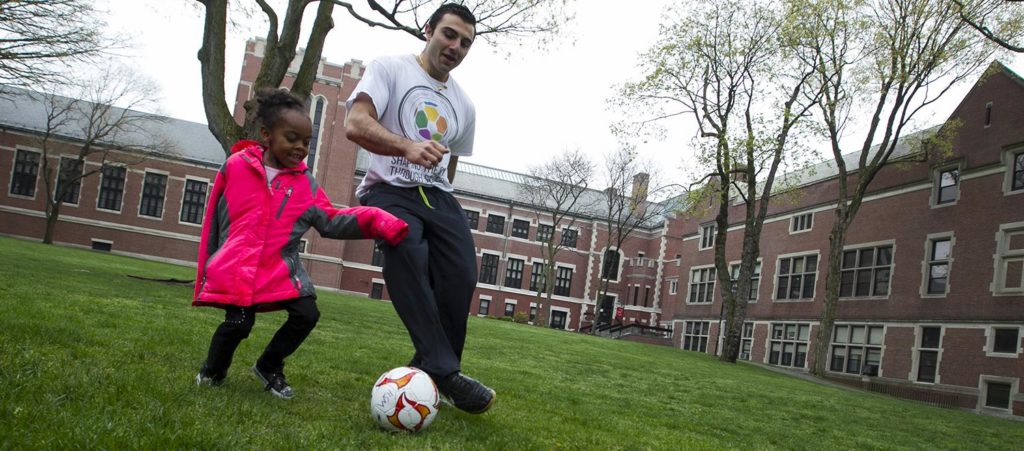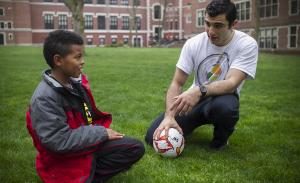Mohamed Elmaola ’18 draws inspiration from failure

On a cool, bright morning last April, Mohamed Elmaola ’18 found himself standing on a stage in Jefferson 320 speaking to a room filled with fourth and fifth graders from Columbus Park Preparatory Academy in Worcester. Wearing a Worcester Soccer House T-shirt, holding a soccer ball, he comfortably asked the more than 50 children a simple question: What can you do to help at home?

Several hands shot into the air, with students calling out into the auditorium: “Be nice to siblings.” “Don’t give attitude.” “Take out the trash.” The last student’s answer, “Make good choices,” made Elmaola pause.
“What good choices can we make?” he asked, which led to a conversation on how small investments of time into positive decisions can lead to big results. Before the children — many of whom would be first-generation college students — set out to see the campus, Elmaola led them in a cheer. “Make good investments!” rang out before the students dissolved into applause.
He didn’t know it at the time, but Elmaola was giving the children inside the room a glimpse into his future.
Along with some friends two years ago, the Worcester native started the Worcester Soccer House, a grassroots organization providing free soccer instruction as well as character-building to children ages 6 to 12, and gained city-wide attention for it. He came to Clark as a Presidential LEEP (Liberal Education and Effective Practice) Scholar with the intent of turning the group into a nonprofit. Last summer, Elmaola, or Coach Mo as the players referred to him, fresh from a second place finish in Clark’s Ureka Big Idea Challenge and with a LEEP fellowship in hand, set out to do just that.
With partnerships forged, he was poised to spread the program citywide, but ran into differences in philosophies with officials whose goals for the program didn’t match his own. “As the summer was progressing, we found the project was less and less feasible,” he says.
The difference was enough to sideline the program and leave Elmaola, a psychology major who’s minoring in innovation and entrepreneurship, feeling adrift. “This was the lowest point of my summer,” he says.
However, this is where the next chapter of Elmaola’s LEEP journey begins.
“I want to provide an opportunity for kids to hear a voice they don’t hear every day.”
He spent time listening to different motivational and business speakers and realized “this is the stuff I love the most.” After a lot of soul searching, Elmaola decided to discontinue work on the soccer house and donate the club’s equipment to Worcester’s Goddard School of Science and Technology.
“The only time I’m the best version of myself is when I’m on a stage speaking in front of people. There was a turning point in my summer when I realized I can keep coaching and probably do OK at it or, given the work ethic I have, I can use my gifts and abilities to deliver more value than I’m doing now,” Elmaola says.
While feeling humbled, he pivoted, realized “there was nothing more liberating than smallness,” and then got to work on his next goal — becoming a motivational speaker for children.
To do this, Elmaola immersed himself in information — from speakers to books — and changed his lifestyle habits to align himself with the role model he believes he should be to the children with whom he connects so naturally.
He continued examining his reasons for taking this path and landed at a simple, but powerful point: He wanted to help others.
“I want to empower and inspire people because there were so many people in my life that were able to guide me on a process given the different challenges I faced,” Elmaola says.
With the “what” and “why” of his endeavor understood, he needed to develop the “how” — his voice and speaking style — so he’s studying the mechanics of speech and storytelling. Elmaola is putting his psychology skills into practice by learning how persuasion functions within discourse under the tutelage of Professor Michael Bamberg. Each week, he and his book discussion group combine exercise of the mind and body during a healthy run.
As fall approached, Elmaola slowly rediscovered a sense of confidence, rebounding from what some would see as a failure with the soccer school.
“Failure is my favorite teacher. This summer gave me the opportunity to be confident in discomfort,” he says. “Now, I see learning from mistakes is a good thing and I formed a positive association with that.”
Elmaola is also more confident in the changing trajectory of his life, and he credits Bamberg for helping him understand that learning isn’t linear. After submitting a long report his first semester at Clark, the professor handed it back to him and told him he needed to think differently to understand the lesson.
“I learned I don’t have to just take tests, I can learn things I care about,” Elmaola says. “That class was an open platform for students to learn in a new way. He teaches the ideal that what you produce isn’t as important as the process.”
Most importantly, Elmaola learned, “At Clark, I learned I can learn from myself.”
Those lessons are part of what he’ll teach his future audiences. He received some early practice this month at the Columbus Park School, where he delivered a speech about heroes, and telling the 60 fifth and sixth graders to make a mental list of the heroes in their lives — and to be prepared to add one more.
“I think you’ll be very surprised to hear who it is,” he said.
Elmaola gave the students a snapshot of his background and life, telling of family turbulence and how hard he worked to earn a scholarship to Clark – his only opportunity to afford a college education. He explained how an inner voice told him to keep going through all the challenges.
He then told the enraptured audience to include themselves on their hero list. “The inner voice is spoken by your inner hero — the person inside who pushes you to be better,” he said.
Hearing the students’ reaction to his words — the pin-drop silence while he was speaking, the applause for his message at the end — affirms his chosen path, and the fact that he’s doing something personally fulfilling provides reassurance.
“I want to provide an opportunity for kids to hear a voice they don’t hear every day. I don’t ever want to be at a point when I’m 30 or 40 and think that I wasn’t doing what I loved all those years,” he says. “There’s no reason for me to do that.”
Above: Elmaola kicks around a soccer ball with a young player from the Worcester Soccer House. (Matthew Healey photos)


